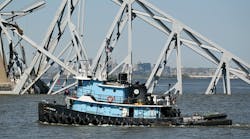What can the President and Congress do about the rising cost of fuel? Very little, according to energy experts like Daniel Yergin, chairman of Cambridge Energy Research Associates and author of the Pulitzer Prize winning book, The Prize: The Epic Quest for Oil, Money and Power.
“We can not begin to understand what is happening at the gasoline pump today unless we see it in a global context involving crude supply, refining and foreign policy and geopolitics,” he told Congress in May. “We are highly integrated into the marketplace, and we surely are affected by what happens in that marketplace.”
Yergin and others told lawmakers that even though the U.S. uses more oil than any other single country, the nation's behavior has little effect on the world market and, therefore, the price.
“There are domestic factors we can talk about — fuel changes and refining capacity — but at the end of the day, it's the crude oil and the price of crude oil that's really the largest determinant [of price] and that's determined in the world market,” Yergin said.
Factors affecting the world price of oil can be pinpointed, however, and they are mainly of our own making, even though some are intangible.
Petroleum pundits suggest that there is no global oil shortage — in fact, long-term crude oil production is at a record high — but that “fear premiums” have raised the price to record levels. The world is experiencing an aggregate short-term shortfall of about 2.2-billion gallons daily because of disruptions and nervousness over oil production in Venezuela, Iraq, the Gulf of Mexico and Nigeria. In addition, the market is worried about political tensions surrounding oil-rich Iran. They point out that every time the President of Iran becomes publicly aggressive (or U.S. officials do likewise) the global price of crude rises, then slowly abates.
“Crude supplies are at eight-year highs,” notes John Kilduff, senior vice president of the Energy Risk Management Group of Fimat USA, Inc. “The price is not reflecting all the oil that is available, it's reflecting the worries about the future of oil production.”
This fact has not stopped legislators from focusing on small pieces of the oil problem and labeling it the most important reason for high prices. Rep. Joe Barton (R-TX) sees the lack of new refinery building as the main issue. Rep. Frank Pallone (D-NJ) sites tax breaks to oil companies.
Others, like Rep. Bart Stupak (D-MI) blame price gougers and market manipulators. Rep. Eliot L. Engel (D-NY) cites oil company executives' greed as the main reason for price hikes, saying: “The President of the United States should call the oil executives into the White House and bang heads together.” Still others suggest that the price of oil would drop if companies were permitted to drill in the Arctic National Wildlife Reserve.
President Bush recently put forth his own list of cures, which includes making sure there is no price gouging, promoting greater fuel efficiency, boosting domestic supplies by deferring deposits to the Strategic Petroleum Reserves and investing in alternative fuels.
Unfortunately, none of these proposals will lower the price of diesel in the short term. The American Trucking Associations estimates that at current prices, the nation's fleets will spend $98.3 billion on fuel this year, a $10.6 billion increase over 2005.
“Every president learns that there is not a lot you can do in the short term,” Yergin concluded. “Most solutions are medium or long term… what really matters is what consumers do, how they save fuel on their own.”


